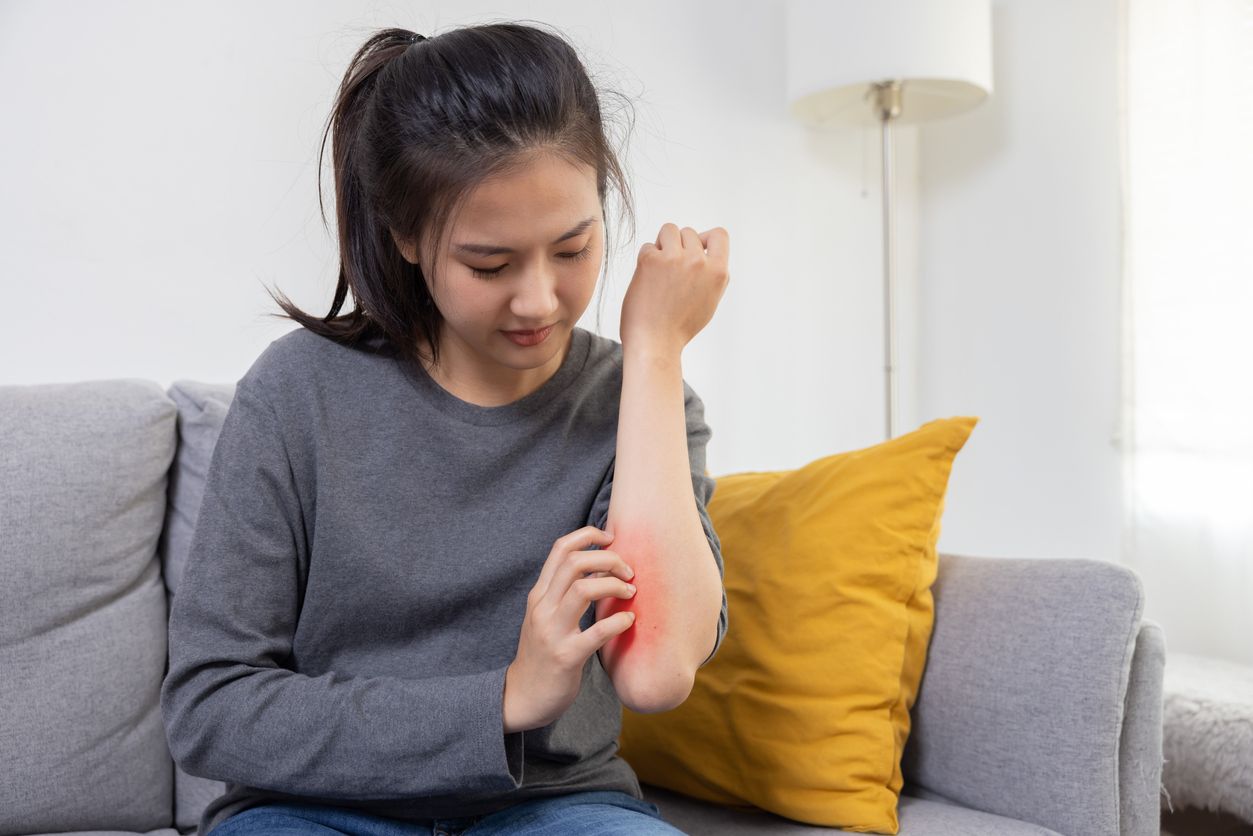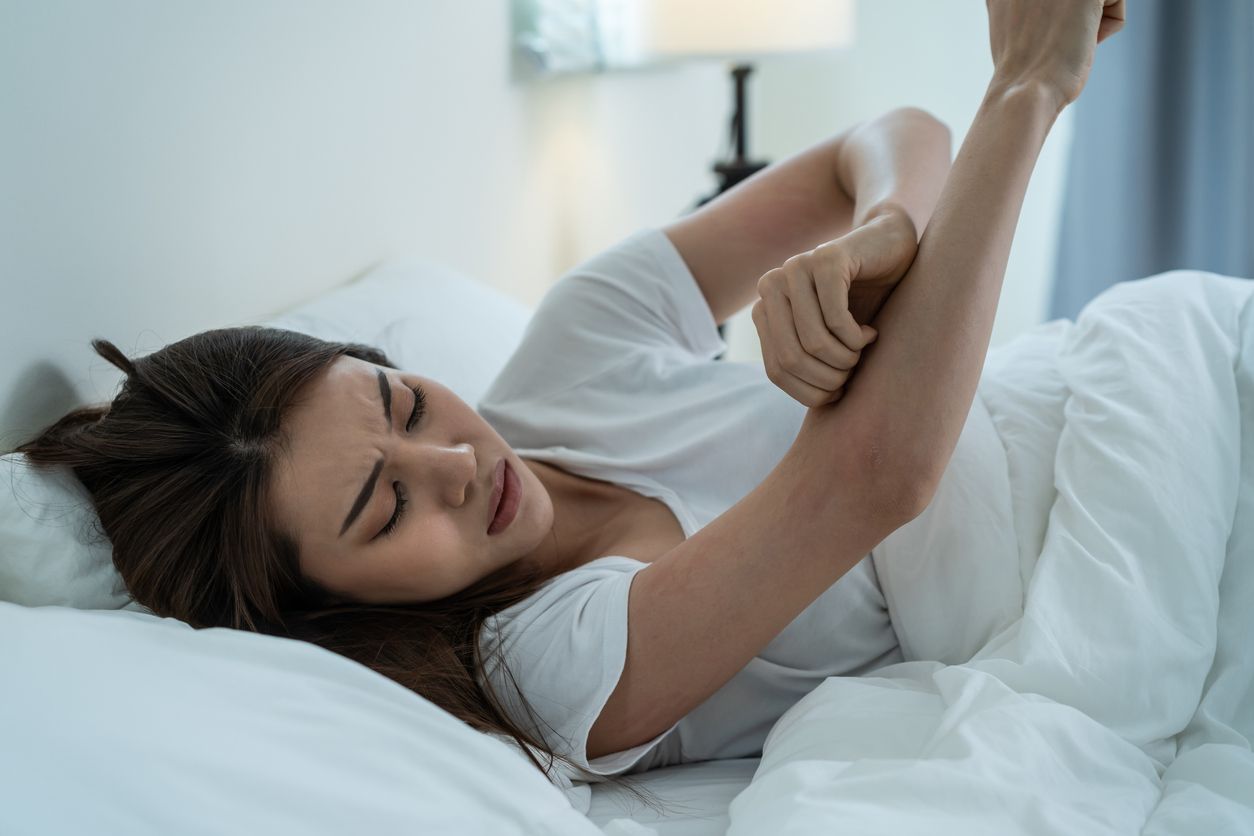
- Home
- Trend
- Weight Loss Strategies
- Acne Tips
- Hair Health Information
- Blemish Removal Tips
- Acne Scar Removal Tips
- Muscle Building Techniques
- Intimate Care Tips
- Postpartum Intimate Care
- Eye Bags Wiki
- Tips for Face Slimming
- Secret of Permanent Hair Removal
- Breast Enlargement Tips
- Cure to Snoring
- Marionette Lines
- Skin-Tightening Secrets
Dealing with unbearable skin itchiness? If your skin condition tends to fluctuate, you may experience itchiness on your face, hands, legs, or even under your clothing. But what exactly causes this persistent discomfort that’s so hard to eliminate? It often comes down to a combination of skin cell function, hormonal activity, and environmental factors. Here’s an in-depth breakdown of 9 common causes of skin itching, plus a comprehensive treatment plan recommended by professional nutritionists and dermatologists—your guide to better skin health starts here!
Why Is My Skin So Itchy? 9 Common Causes Explained

1. Weather Changes: Dryness and Temperature Swings Disrupt the Skin Barrier
Climate changes—especially in dry autumn and winter seasons—can reduce humidity and lead to sun damage and moisture loss, resulting in itchiness. In hotter weather, sweat and its salt content may irritate the skin. Sudden temperature shifts can also overstimulate nerve endings by affecting blood vessel dilation and constriction.
2. Chronic Skin Conditions: Recurring Issues Like Eczema and Psoriasis
Eczema, atopic dermatitis, and psoriasis are major culprits of persistent itching. These conditions often come with dryness, redness, and flaking, and may flare up due to environmental, emotional, or immune-related triggers. The resulting itch-scratch cycle can seriously affect sleep and quality of life.
3. Acute Allergic Reactions: Sudden, Intense Itchiness
Exposure to allergens like certain foods, medications, cosmetics, pollen, or pet hair can trigger reactions such as hives or rashes, causing sudden swelling, welts, and severe itchiness. These reactions usually occur within minutes to hours and require immediate identification and treatment.
4. Nervous and Immune System Imbalances: Itching from Within
Sometimes, itchiness doesn’t come from surface irritation but from neurological or immune dysfunction. Conditions like neurodermatitis, multiple sclerosis, or post-shingles nerve damage can lead to unexplained itchiness. Autoimmune diseases and HIV can also weaken skin defenses and trigger chronic itching.
5. Hormonal Changes: A Common Trigger in Women During Puberty, Pregnancy, or Menopause
Hormonal fluctuations impact skin sensitivity. During puberty, excess oil production may clog pores and cause itching. Pregnant women may experience pruritic conditions due to hormonal shifts, while menopausal women may develop dry, fragile skin from declining estrogen levels.
6. Drug Allergies and Side Effects: Unexpected Reactions from Treatment
Medications like antibiotics, painkillers, or antihypertensives can trigger skin reactions such as rashes or allergic bruising. Some drugs can also affect nerve signals or disrupt oil production, leading to unexplained itchiness. Monitoring your body’s response to medication is crucial.
7. Insect Bites: Localized Inflammation That Itches
Bites from mosquitoes, fleas, mites, or bedbugs can inject irritants that provoke immune responses, resulting in redness, bumps, or intense itchiness. Some individuals may be especially sensitive, developing blisters or allergic reactions. Warm, humid environments heighten the risk.
8. Lifestyle and Stress: How Mind and Body Affect Your Skin
Poor habits like staying up late, eating greasy foods, and avoiding exercise disrupt metabolism and hormonal balance, making the skin more sensitive. Chronic stress raises cortisol levels, which can impair immunity and weaken the skin barrier, increasing itchiness and allergy risk.
9. Poor Hygiene: Dust Mites and Allergens Lurking in Your Home
Neglecting to regularly wash bedding or clean your environment can lead to dust mite infestations. These microscopic creatures and their waste are known allergens that can irritate the skin. Excessive bathing or harsh products can also damage the skin barrier, leading to dryness and itching.
6 Common Symptoms of Itchy Skin — When Should You See a Doctor?

Symptoms can vary depending on the root cause. Recognizing the signs can help you take timely action:
• Persistent or intermittent itchiness – The hallmark of itchy skin.
• Redness or swelling – Skin may appear inflamed or blotchy.
• Rashes – Bumps, blisters, or hives may develop.
• Dryness or flaking – Skin may crack or peel.
• Thickened, leathery skin – Chronic scratching can lead to lichenification.
• Scratch marks – These can damage the skin and invite infection.
When to seek medical help: If symptoms persist, worsen, affect your sleep or daily life, or are accompanied by fever or swollen lymph nodes, consult a healthcare provider promptly.
免費體驗
Acne Treatment
1 Minute Self-Registration
Date should not be before minimal date
4 Effective Treatments for Itchy Skin — Is Vitamin A Really That Important?
1. Anti-Itch Creams
• Steroid creams: Reduce inflammation and itch but may cause side effects with long-term use.
• Antihistamine creams: Help relieve itch caused by allergic reactions.
• Moisturizing creams: Ideal for itchiness due to dry skin.
• Oral treatments: May include Vitamin A, isotretinoin, antihistamines, or corticosteroids.
→ Always use under medical supervision.
2. Phototherapy
UVB light therapy is effective for skin conditions like eczema or psoriasis. You can choose at-home beauty devices or professional dermatological treatments.
3. Wet Wrap Therapy
Helpful for inflammation and dryness, though only temporarily soothing. It’s not a cure for chronic itch.
4. Daily Habit Adjustments
• Avoid allergens and harsh chemicals.
• Wear loose, breathable clothing.
• Use a humidifier to keep air moist and skin hydrated.
Prevention Is Better Than Cure — Smart Tips to Avoid Itchy Skin
• Keep skin clean and moisturized: Use gentle cleansers and apply lotion after bathing.
• Avoid allergens: Identify and steer clear of your triggers.
• Wear breathable clothes: Opt for loose-fitting cotton garments.
• Stay cool: Use air conditioners or fans for ventilation.
• Manage stress: Practice stress-reduction techniques.
• Watch your diet: Avoid spicy or irritating foods.
• Use mild products: Choose fragrance- and alcohol-free cleansers.
The Ultimate Itch-Fighting Secret: Perfect Medical Acne Treatment
Still can’t pinpoint what’s causing the itch? The solution may be simpler than you think! Try Perfect Medical’s painless, non-invasive Acne Treatment. Whether you’re dealing with rashes, acne, acne scars, blackheads, clogged pores, rough texture, or dryness, this treatment helps calm inflammation and restore skin balance.
Perfect Medical’s treatment uses dual-direction vacuum suction and microdermabrasion to deeply cleanse pores, balance oil levels, and gently exfoliate dead skin cells. It also stimulates collagen production from within, helping to prevent recurring skin issues like itchiness. Book now to enjoy a full professional skin analysis + Acne Treatment!
Book Now: Acne Treatment免費體驗
Acne Treatment
1 Minute Self-Registration
Date should not be before minimal date
FAQ

Is itchy skin a sign of cellulitis?
Possibly, but cellulitis usually causes swelling, heat, and pain rather than itch. A doctor’s diagnosis is necessary.
Can itchy skin be linked to liver problems?
Yes. When liver, gallbladder, or pancreas issues cause bile duct obstruction, bile builds up and causes skin itch. It can even indicate pancreatic cancer risk.
Can weather changes cause itching?
Definitely. Environmental shifts can stress the skin and trigger itch, especially after sunburn.
Can chemicals trigger itchy skin?
Yes. Some people react to chemicals by developing allergic or irritation-related itchiness—even through inhalation or direct contact.
What is folliculitis?
A common cause of skin itchiness, often appearing on the scalp or face as inflamed pimples or acne-like bumps.








